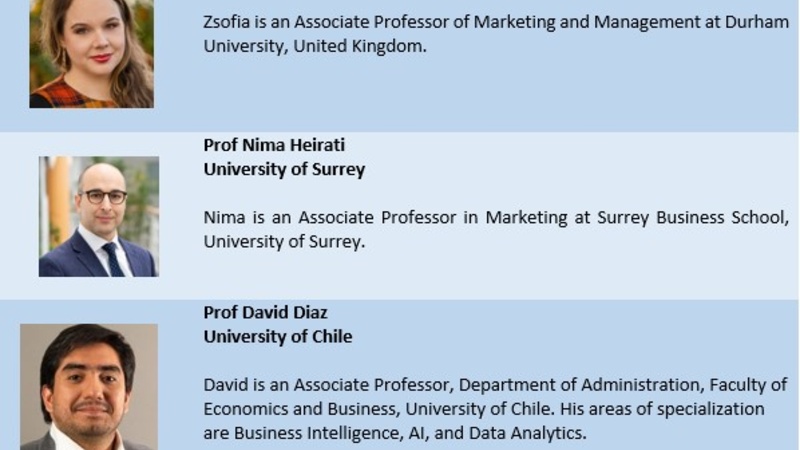Academic Panel 2
Academic Panel 2 – Summary
‘How to develop an academic career as a scholar in Service Management’
Building a Successful Academic Career: Insights and Strategies
Academia can be a rewarding but challenging journey, especially in fields like service management. Drawing from a recent panel discussion with seasoned academics, this article outlines key strategies, advice, and insights for building a thriving academic career. The discussion explored themes such as networking, mentorship, teaching, and overcoming challenges, offering practical guidance for early career researchers and established academics alike.
Key Themes for Academic Success
1. Define Your Academic Identity
Success in academia begins with clarity of focus. Decide how you want the academic world to associate your name. Whether you choose to specialize in a niche area or a broader discipline, having a clear professional identity helps establish your "academic brand."
"Any flower is like a weed with a significant marketing budget. You need to define what your budget is—time, space, and networks are crucial."
2. Build Strong Networks and Collaborations
Networking is fundamental at every stage of your academic journey. From local colleagues to international peers, building relationships fosters collaboration and innovation. Attend conferences, engage with peers, and connect with senior academics to strengthen your professional network.
"Fly with eagles, not with little birds. Surround yourself with people who inspire and challenge you."
3. Be Strategic and Proactive
Early in your career, take deliberate steps to build a strong foundation. Publish in reputable journals, apply for grants, and seek mentorship to navigate the nuances of academic life. Align your efforts with your institution's criteria for promotions, whether it’s research impact, publication quality, or leadership contributions.
The Power of Mentorship
Mentorship plays a pivotal role in academic success. Senior academics can provide guidance, share insights, and help you navigate challenges. Informal mentoring relationships and peer support, such as PhD "buddies," offer a safe space to share concerns and receive constructive advice.
"Find a 'Big Bear'—a senior academic who can guide and protect you as you navigate your career."
Mentors can also help refine your teaching and research skills. Early career researchers (ECRs) benefit greatly from guidance on research design, publication strategies, and conference selection.
Overcoming Challenges
Academics often face hurdles, such as heavy teaching loads, unsupportive environments, or a lack of confidence. Transitioning to new institutions or disciplines can also be daunting. However, adaptability and persistence are key to overcoming these barriers.
Strategies for Success:
- Choose impactful conferences and attend them regularly to build meaningful networks.
- Collaborate with like-minded individuals to drive innovation.
- Focus on selective, high-impact publications that align with your career goals.
Balancing Research, Teaching, and Leadership
1. Effective Teaching Strategies
Innovative teaching methods help keep students engaged and foster critical thinking. For example:
- Use interactive tools like Mentimeter for real-time feedback.
- Incorporate real-world tasks, such as stock market simulations or service journey interviews, to make learning practical and relevant.
- Adapt teaching styles based on class size and audience (undergraduates, postgraduates, or PhDs).
2. Research Impact and Publication Strategy
While publishing in high-tier journals is important, maintaining a diverse portfolio can balance institutional demands with personal interests. Avoid overcommitting to collaborations and prioritize quality over quantity to preserve your reputation.
3. Leadership Roles
Engaging in leadership roles—such as committee memberships or project management—provides opportunities to shape institutional policies and mentor others. This not only enriches your academic portfolio but also enhances your impact within the community.
Creating a Supportive Environment
Institutions play a vital role in academic success. Seek environments that offer the time, space, and resources necessary for flourishing. For academics in service management, geographic and cultural differences may influence research and teaching styles. For instance, Scandinavian institutions often excel in case-based teaching, while UK academics may face challenges due to broader marketing-oriented roles.
Avoiding Pitfalls:
- Don’t isolate yourself; embrace networking opportunities.
- Seek mentorship early to navigate career uncertainties.
- Stay resilient and adaptable, even when institutional challenges arise.
Final Thoughts
Building a successful academic career requires a combination of strategic planning, networking, mentorship, and resilience. By defining your academic identity, engaging with supportive communities, and embracing opportunities for growth, you can thrive in academia. Whether you are an early career researcher or a seasoned academic, the keys to success lie in maintaining focus, seeking guidance, and fostering connections.
Academia is not just about research and teaching—it’s about shaping a meaningful, impactful career. By following these strategies, you can navigate the complexities of academia and achieve long-term success.
Members of the Panel:

